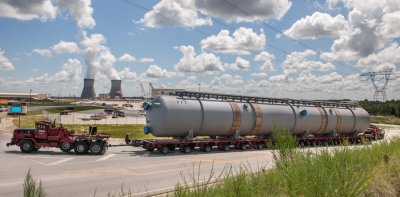New report shows solar, energy efficiency outcompete nuclear in meeting Georgia’s energy needs
A recent report shows that replacing the Plant Vogtle nuclear expansion with new investments in solar power and energy efficiency would be less risky, more affordable, and more than up to the job of powering Georgia’s economy.
Once deemed the most prudent path forward for Georgia’s growing energy needs, Plant Vogtle has now priced itself out of the market. Already delayed by at least three years and billions of dollars over budget, the Vogtle project hit a new snag in March when the contractor, Westinghouse, declared bankruptcy, raising fresh doubts about the project’s viability.
The expansion of the Plant Vogtle nuclear power plant in Georgia is now 3 years over schedule and billions of dollars over budget with no end in sight.
Plant Vogtle
For the first time since construction commenced, Georgia regulators have begun openly to question whether the Vogtle project can be completed and, assuming it can, whether continuing is worth the steadily mounting costs.
With the project at a vital crossroads, SELC and partner Vote Solar saw the need for an objective assessment to review where we are, how we got here, and the potential implications of halting construction, so they reached out The Greenlink Group.
The conclusion of The Greenlink Group’s report: stopping the project won’t harm Georgia’s electric customers and, in fact, customers would reap more immediate benefits from continued in-state investments in energy efficiency and solar resources.
Georgia regulators’ smart investments in solar power and efficiency programs over the past few years have laid the groundwork for these resources to outcompete Vogtle now. Energy demand projections—the basis for the new units’ approval nine years ago—have since been met through greater efficiency measures and increasingly affordable solar power.
The result: even without the Vogtle units, Georgia will have more than sufficient capacity to meet its growing economy’s electric needs through 2030.
While the Vogtle units continue to add to customers’ bills (the average customer is already paying $100 per year in financing costs alone), energy efficiency and solar are having the opposite effect. For example, Georgia’s recent solar investments are projected to save customers hundreds of millions of dollars in avoided energy costs over the next few decades.
If ever there was a time for Georgia to boost its investments in efficiency and solar programs, that time is now,” said Kurt Ebersbach, Senior Attorney in SELC’s Atlanta office. “After years of paying for units that may never deliver a kilowatt-hour of electricity, Georgia consumers need the very real bill relief that those investments would afford.
A crucial decision point for Vogtle is quickly approaching, as Georgia Power (which owns the largest share of the project) and Westinghouse are expected to conclude negotiations over the project’s fate later today.
Here’s the silver lining in Vogtle’s cloudy outlook: the Georgia Public Service Commission’s strong leadership on solar power has laid the foundation for solar to come to customers’ rescue now,” said Katie Ottenweller, Senior Attorney and leader of SELC’s Solar Initiative. “Shifting to solar at this pivotal moment is the most prudent decision to protect Georgia customers, meet any increases in energy demand, and deliver dependable bill savings.
